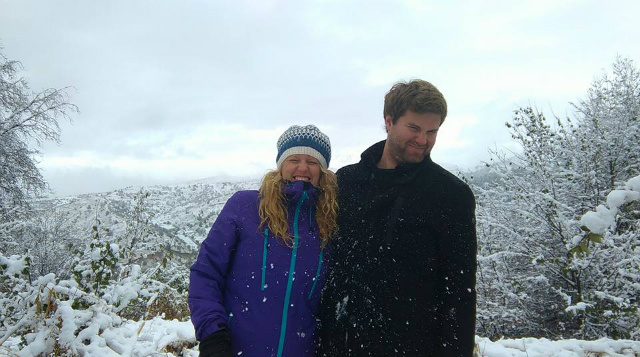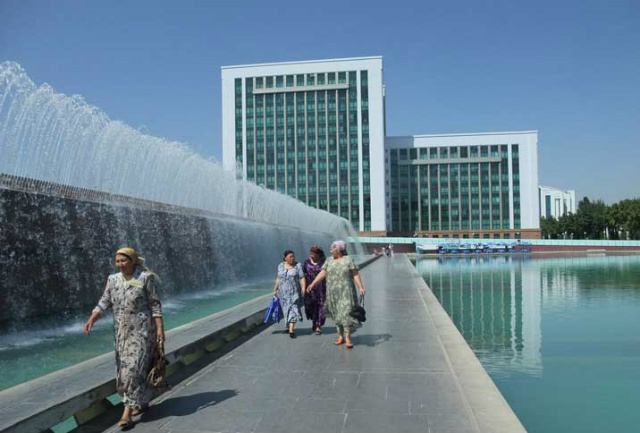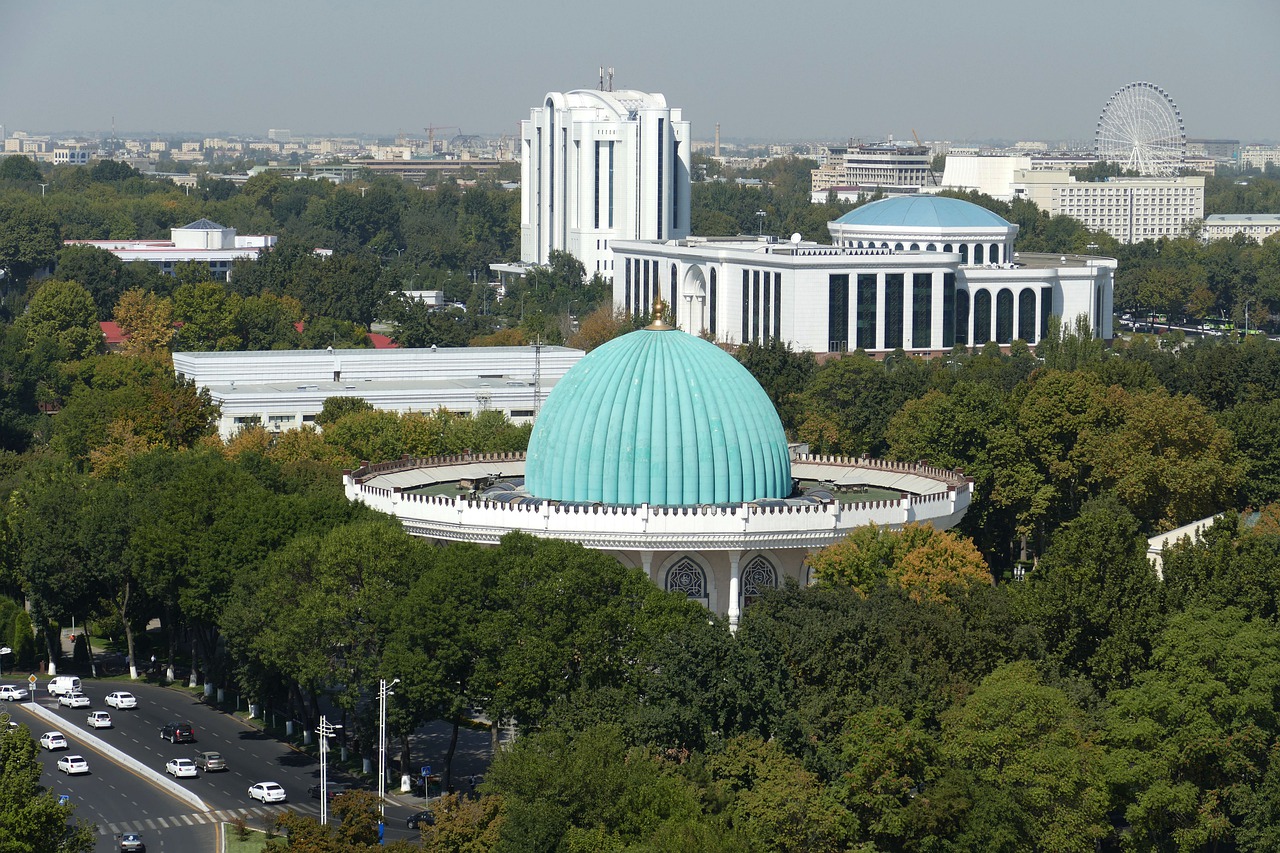When you think of teaching in Asia, what springs to mind? A stint in China, Japan, or somewhere beachy in Southeast Asia? International teacher Simon Stevens decided to go off the beaten track and head for the chilly landlocked republic of Uzbekistan. Not a rice paddy or a palm tree in sight! So, what is life actually like teaching in Tashkent?
My wife, Melissa and I were looking for something completely different after spending the last three years in Uganda. After a stretch living under the never ending sun, we were keen to find somewhere with seasons. The other box that needed to be checked was that it had to be a place that neither knew anything about.

Braving the snow in Tashkent
Well, Uzbekistan fits both categories neatly. Of course, we’d heard bits and bobs, but I would probably have struggled to pick it out on a map. Now we’ve got stuck in and found out lots about the history of the Silk Road, admired the majesty of Samarkand’s Registan and spent a couple of days in the mountains. We’ve also been flung into the new climate with 40 degrees celsius greeting us on arrival and within a couple of months we’ve been covered in snow (albeit in the mountains, 2000 metres up) and been battling with our Soviet era boiler.
Our school, the British School of Tashkent, is almost the complete opposite of the one we’d left behind. From a spacious, but old fashioned and ill thought out complex in Kampala, we now find ourselves squeezed up in one super well equipped, high tech three storey building that is fit to burst with children.
With primary and secondary together, I’ve had to grow used to ankle biters bumping into me now and again, while they’ve had to cope with an imposing grumpy giant glaring at them when they happen to get in my way. I’m slowly adjusting. Luckily secondary has most of the top floor to itself and my English classroom is a peaceful hideaway from primary madness.
Initially we joined primarily for my job as a First Language English teacher and my wife was going to work as a teaching assistant as there were no PE positions available. However, with international schools naturally being a bit tempestuous in terms of recruitment and retention, it only took a few weeks and she was offered a job teaching in primary until Christmas.
A terrifying prospect for any secondary teacher, she is quickly coming to terms with it and by the way she keeps droning on about all her ankle biters I can tell that she’s beginning to love it. The extra income comes in handy for our savings and the temporary nature of her role is ideal as we found out she’s carrying a sprog on our first day in Tashkent.
The school has proved to be our main source of expat friends (there were around 10 new expat teachers joining this year) as Tashkent is not particularly internationalised. There are lots of lovely restaurants and bars to meet up in, but they are spattered around the city somewhat and it can be a bit of a slog to arrange an evening out. Also, we’ve finally got some proper shops and shopping malls where you could stick your fingers in your ears and pretend you’re back in Blighty (for those low moments of home sickness every expat has). We’ve been helped out to a degree as we live in an international compound with a few of our colleagues so can always grab a quick bite or drink, but others have not been so lucky. However, the rest of the international compound consists of mainly non-English speaking families who we don’t have much to do with.
We’ve also done a little bit of travelling around the country, which is cheap, comfortable and well organised. However, the tourist activities aren’t particularly spectacular as the country doesn’t seem to have set itself up for tourism: you arrive at a grand old building, but there is no information about why it was built, when or what relevance it has to the history of the country.

Tashkent Senate Building
Also, we’ve found hospitality to be a bit lacking in a couple of places. On our trip to the mountains with friends from home, the receptionist groaned when we entered and did everything he could to convince us not to stay. Unfortunately we were trapped by a snow storm, which left us surrounded by an utterly beautiful winter setting, but also trapped inside a hotel that reminded us all of The Shining.
Our hosts are often completely unable to understand us and we are unable to understand them, which has led to us creating our own unique brand of sign language that is pretty ineffective.
Surprisingly, outside of the hospitality industry, Uzbek people are bloody lovely. They can seem a bit stony faced at first, but they love to make you feel welcome and have a chat with you. The greatest thing about the place is that if you want to get about you don’t need to use taxis, but you just stick your thumb out and explain poorly in sign language where you want to go and any old Begzod or Islom will take you to your destination for just a couple of dollars. I don’t understand how there is a separate taxi industry in the country!
The people are very proud of their country and are happy to show you their shiny golden teeth (disgusting!), to point out the architectural masterpiece that is the TV Tower (it looks like a child’s toy rocket) or to explain in detail why plov is the most wonderful culinary delight in the world (it isn’t). At least this is what I think they are saying when they are pointing, gesturing and smiling.
It’s also a ridiculously cheap place to live. If you go to the most expensive restaurant and order three courses and enough beers or wine to sink a ship, you’ll still probably come home with change for $50. As with everywhere, there are some things that are more expensive, but not to the extent where you can’t afford it comfortably with your local salary. The only things that are overpriced are the tourist attractions, which might cost $3-5, but are just not really well set up to make them interesting and worth visiting. Oh, and that bloody hotel in the mountains! The worst $70 I’ve ever spent.
I mentioned local salary above. We get around three quarters of our salary sent straight back home into our bank account and the other quarter paid in Uzbek s’om. I’ve never saved so much in my life and together we are chipping away at a future mortgage steadily and if we stayed here for a few years we’d be able to buy some sort of minor palace (think Hampton Court Palace rather than Buckingham Palace). The local salary is hilarious! One dollar is worth 5,000 s’om and their biggest note is worth 5,000 s’om. We had a suitcase full of money and felt a bit like we were in Breaking Bad when we received our first month and a half’s wages in two black bin bags.
The school and city have a few good and bad points, as does every school. We are pretty unhappy about the speed things get fixed in our house and work men are often stinky and incompetent. In addition, the novelty of cold weather has worn off to some degree as it is difficult to heat our house effectively at the moment; a few months ago it was difficult to cool ourselves. My wife’s sign language and basic Uzbek and Russian are nowhere near as advanced as my own and I know she’s been frustrated by the fact there are not many people in the country who speak English well.
However, I’m pretty happy with the place. The school is well equipped and has lots of well trained and friendly expat staff. Our social life is gradually growing and has suffered most as a result of morning sickness and hormones making my wife a bit crazy.
I think that if you wanted to move here you’d have to be prepared to feel a bit uncomfortable at first. It’s an interesting country, but more for the people and difference in lifestyle and culture than from a tourist’s perspective – don’t expect to be amazed by the landmarks, no matter what the Lonely Planet says. If you want to save then this is the place for you. However, if you like to exist in an expat bubble then you’ll probably feel a bit isolated and lonely here.
Good luck with your job hunting.
If your interest is piqued by chilly Central Asia, why not check for current vacancies in Uzbekistan or neighbouring Kazakhstan? Or check out this fantastic guest post by a teacher in Mongolia.




